Empowering Smiles: Exploring the Work of UWA Fogarty Alumni Jee-Yun Leung in Special Needs Dentistry
In our ‘Alumni Stories’ series, we celebrate the remarkable achievements of our UWA Fogarty alumni who are making a tangible difference in their communities. Dr. Jee-Yun Leung, a University of Western Australia (UWA) graduate and a proud Fogarty Alumni, stands as an example of this dedication through her work in Special Needs Dentistry (SND).
As the only Specialist in SND in Western Australia, Dr. Leung has made it her mission to address the oral health disparities faced by individuals with special needs. Working as a Consultant at Fiona Stanley Hospital, she provides essential care to patients with complex medical conditions and disabilities, all while actively contributing to dental education and research.
Reflecting on her journey, Dr. Leung credits her time at UWA and her experience as a Fogarty Scholar for shaping her career path. “Going through the leadership program, listening to inspiring talks, and networking with leaders from various community sectors was formative,” she says. “It translated my sense of social responsibility into a realisation that I, too, could aspire to become a leader in improving the oral health system for persons living with special needs.”
Dr. Leung’s interest in Special Needs Dentistry was sparked early. “My career choices have always been driven by a strong belief in social responsibility and a desire to tackle the oral health inequalities faced by those living with special needs,” she explains. Her passion for this field originated from volunteering at a camp for children with special needs in high school and working part-time at an Australian Red Cross respite centre during her undergraduate studies. “I was confronted by the challenges faced by those living with special needs and their carers and found great reward in turning compassion into action.”
It wasn’t until her fourth year of dental school that Dr. Leung discovered Special Needs Dentistry as a specialty. “I didn’t know SND was a specialty until then because there were no qualified Specialists in WA at the time,” she recalls. A chance encounter at a Dental Public Health conference in Sydney led her to explore the field further, undertaking placements in SND Departments in Sydney and Melbourne. This experience solidified her passion for combining her professional skills with her commitment to helping those living with special needs.
After graduating from UWA in 2012, Dr. Leung worked in various dental settings, including regional, metropolitan, government, and private practices. Her diverse experience provided a comprehensive understanding of the dental needs of the community, particularly those with intellectual disabilities and the elderly.
In 2017, she moved to London to pursue a Masters in Special Care Dentistry at the Eastman Dental Institute, University College London. “The UK is a global leader in SND clinical care and public health research,” she notes. “It was fascinating working in a country where SND is so established, and learning evidence-based guidelines and public health policy.” This was followed up by completing specialty training in Adelaide, to understand the Australian health system relevant to SND and build a local network.
Upon returning to Perth in 2022, Dr. Leung took on her current role at Fiona Stanley Hospital. She is spearheading the expansion of the SND service, participating in the Head & Neck Cancer Multidisciplinary Team, and teaching UWA dental students. She serves on the State Oral Health Advisory Committee, the principle advisory group responsible for the provision of expert advice for the WA Government Chief Dental Office, to contribute to and influence the development and implementation of oral health policy within Western Australia. Additionally, she is actively involved with the Australian and New Zealand Academy of Special Needs Dentistry.
Despite the rewarding nature of the sector, Dr. Leung explains this field can have many challenges. “There are many barriers to accessing dental care for people living with special needs,” she explains. These include a lack of patient and carer awareness about the importance of oral care, dentists unwilling to treat people with disabilities, and long waiting lists for specialised SND services. “These challenges can lead to situational crises, such as when strong, heavy and tall individuals with severe non-verbal autism develop aggressive and self-harming behaviours as a way of communicating their dental pain caused by untreated decay. This overwhelms their carers resulting in risks to patient and staff safety” she says. To address these issues, Dr. Leung wears multiple hats—clinician, advocate, public health leader, and educator. She is passionate about establishing quality SND services in WA and educating future generations of dentists to feel comfortable treating patients with special needs.
Dr. Leung received an Australian Dental Research Foundation Grant focusing on oral health delivery systems for people with special needs. “As a single clinician, I can only see so many patients,” she says, “To see improvement on a population level, we need system-wide changes and clear public health policies.” Her research has highlighted the need for a community-based approach to SND, with specialists providing care for the most complex cases and supporting generalists in treating those with mild to moderate needs. “We need a multi-faceted and multidisciplinary approach that integrates the best research evidence with clinical expertise and patient values,” she emphasises.
Looking ahead, Dr. Leung envisions a future where SND services in WA are better coordinated and accessible. “We need to raise awareness of SND, support general dentists to feel confident and see the reward in treating people living with special needs.’’ she says. She hopes to continue her work in public-sector dental service delivery and contribute to the education and training of future specialists.
“SND is an incredibly rewarding and intellectually challenging field that meets a significantly underserved need in our population,” she says. “I hope to continue supporting other dentists and expanding our profession’s knowledge base to improve outcomes for these patients.”
For aspiring dental professionals interested in SND, Dr. Leung offers simple but urgent advice: “Get in touch! We desperately need more of an SND workforce in Western Australia.” She also emphasises the importance of interdisciplinary collaboration in addressing the oral health needs of individuals with special needs. “Interdisciplinary collaboration is essential because these patients do not have isolated dental issues,” she explains. “We need to work closely with other healthcare professionals to ensure that dental treatment aligns with overall treatment goals.”
Dr. Leung’s dedication to enhancing the lives of individuals with special needs is an inspiration to future healthcare professionals. Her work in Special Needs Dentistry reflects her strong commitment to social responsibility and offers hope for a more inclusive healthcare system.
For further information or to connect with Dr Leung, please feel free to reach out to the Foundation at info@fogartyfoundation.org.au
The 25th World Space Week, happening from October 4-10, 2024, will focus on the theme “Space & Climate Change.” This year’s theme emphasises the essential role of space technologies in understanding and mitigating the impacts of climate change on Earth. By exploring the connection between space exploration and environmental sustainability, the event is set to drive a global dialogue on how space can contribute to a more sustainable future.
“We will emphasise the essential role that space plays in monitoring the Earth’s climate and mitigating climate change,” […] “This theme aims to spark worldwide educational and public outreach initiatives, showcasing the crucial and integral part that space plays in understanding our global environment,” Dennis Stone, President of the World Space Week Association
Alma Okpalefe, the Association’s Executive Director, echoed the sentiment, emphasising the necessity of utilising space research to gather vital data about the health of our planet. “As space research equips us with vital data about the health of our planet, we must utilise it to effect meaningful climate action,” she said.
To assist teachers and educators in inspiring the next generation, the World Space Week Association provides valuable educational resources, including the ‘Heinlein Teacher Guide’ and ‘WSW Teacher Activity Guide.’ These resources are designed to promote space-based activities in the classroom, creating an engaging and interactive learning experience for students. These guides can be downloaded from the official World Space Week website.
In addition to these guides, the Association offers access to a wealth of education materials through its global network of Space and STEM education partners. These resources cover a wide range of topics related to space science, technology, engineering, and mathematics, providing educators with a diverse toolkit to enhance their teaching methods during World Space Week.
How Australian Schools and Students Can Get Involved:
- Schools can incorporate the “Space & Climate Change” theme across various subjects throughout a year, fostering interdisciplinary learning. This might include science lessons on climate monitoring from space, geography studies on environmental patterns, or literature and art projects inspired by the theme of sustainability. Check out educational resources here!
- Engage students in hands-on projects that can showcase the impact of climate change and the role of space technology in monitoring environmental changes. These projects could involve creating models, conducting experiments, or collaborating on community initiatives related to climate awareness.
- Invite experts in climate science and space technology to deliver workshops and presentations. This will provide students with valuable insights into the contributions of space in understanding and tackling climate change.
World Space Week 2024’s theme of “Space & Climate Change” provides a unique opportunity for schools and students to delve into the intersection of space exploration and environmental stewardship. By aligning educational initiatives with this theme and utilizing available resources, schools can play a crucial role in fostering awareness, sparking curiosity, and inspiring the next generation of environmentally conscious space enthusiasts. For more information and to access educational resources, visit www.worldspaceweek.org.
The Fogarty Foundation, which has championed change through education for the past 25 years, is proud to share its position paper outlining key priorities for improving education in Western Australia. As an organisation dedicated to enhancing educational outcomes, we believe education is the cornerstone of a prosperous and healthy state.
In the lead-up to the next State election in March 2025, we are presenting our observations and recommendations to guide the development of future education policies. This paper highlights the challenges and opportunities within the current system and provides strategic priorities to ensure that every student in WA receives high-quality, evidence-based teaching and support.
Key 4 Key Priorities;
- Build a Strong, Supported Workforce: Ensuring that all students have access to quality, evidence-based teaching by creating a robust, well-supported teaching workforce.
- Implement a Whole-School Approach: Schools should adopt a coordinated approach to curriculum planning and delivery, backed by quality resources and materials that enhance learning outcomes.
- Resource Schools as Community Hubs: Schools should be equipped to act as central community spaces, fostering learning environments that build confident and resilient learners.
- Raise Educational Aspirations: Setting high expectations for all students and providing meaningful pathways to ensure their success and growth.
These priorities are consistent with the national goals outlined in the Alice Springs (Mparntwe) Education Declaration, which calls for a system promoting excellence and equity. The Declaration envisions young Australians as confident individuals, lifelong learners, and active, informed community members.
Additionally, our recommendations align with the Better and Fairer Schools Agreement 2025-2034, recently signed by the State, which commits $1.6 billion in matched funding to improve educational outcomes across WA.
We invite the public to read our full report, which details the rationale behind these priorities. We believe that by addressing these key areas, WA can take significant strides toward creating a more equitable and effective education system for all students.
Download the full paper below
After 13 years’ involvement with the Fogarty Foundation, including through her most recent role as CEO, Megan Enders will be stepping down from the Foundation, effective 16 October.
Megan’s leadership has been transformative, most notably through her establishment – together with education expert Keith Newton – of the Fogarty EDvance program, a whole school improvement initiative that became one of the Foundation’s flagship programs. Developed collaboratively with the WA Department of Education, Catholic Education WA and a diverse group of stakeholders, this decade long program has assisted over 140 schools in low socio-economic communities across Western Australia to deliver improved outcomes for their students*.
Megan has served as a member of the Foundation’s Board of Trustees since 2018 and, over time, built networks and supported collaborations as well as strengthened relationships to enhance the Foundation’s capacity and impact. This includes Fogarty Foundation becoming a founding member of the innovative Investment Dialogue for Australia’s Children, establishing and leading a collaboration of WA funders, setting up a community of practice for prestigious scholarships and as the Co-Chair of Philanthropy Australia’s Education Funders’ Network.
She has also helped the Foundation to mark two major milestones, the 20th anniversary of the prestigious UWA Fogarty Scholarship Program and the 10th anniversary of the Fogarty EDvance program. Establishing an online community of practice and publicly available database of the highly accomplished cohort of 198 UWA Fogarty Scholars; and helping to set up a pipeline of events that promote opportunities to explore entrepreneurship and innovation for young people in WA’s regions are two other key achievements during her time as CEO.
After enjoying some time with family as two of her five children finish high school in the coming months, Megan is keen to keep nurturing the collaborative funding landscape within Australian philanthropy, with a particular focus on education and health. On behalf of the Foundation’s Board of Trustees we extend our gratitude to Megan for her exceptional leadership and unwavering commitment. She leaves the Foundation in a strong position, and we wish her every success in her future endeavours.
The Foundation will announce its new CEO in the coming weeks.
* Fogarty EDvance is now being delivered by Knowledge Society, as of February 2023
Exploring Global Sustainability Through a Complex Systems Lens: An Interview with Sasha Quahe
Sasha Quahe, a UWA Fogarty Scholar Alum, is a passionate advocate for sustainable development and an emerging leader in sustainability science research. Currently a PhD candidate at the Stockholm Resilience Centre in Sweden, Sasha’s research delves into the philosophical foundations of how change occurs in social-ecological systems, with a focus on the role that crises play in triggering or inhibiting positive transformations.
Sasha’s path to sustainability science was shaped by her diverse academic background. She began her academic journey at the University of Western Australia, where she studied Political Science, International Relations, and Economics. “My interests in history, literature, language, and activities like debating and UN Youth in high school naturally led me to explore the social systems of the world,” she recalls. “As I learnt more about Economics and Political Science, I became increasingly curious about climate politics and environmental issues.”
A pivotal moment in her academic career came during an exchange program in Grenoble, France, where she studied climate change diplomacy. “That experience sparked my interest in environmental politics,” Sasha shares. This newfound passion eventually guided her to pursue a Master’s degree in Social-Ecological Resilience for Sustainable Development at the Stockholm Resilience Centre. Her thesis focused on the framing of science-based target setting for various global environmental issues. “Complex systems science shows us that what we think of as ‘environmental’ issues are also very much about people,” Sasha explains. “We live in complex systems where people and nature interact in so many different ways. I want to understand how we can influence these systems toward sustainability.”
Before transitioning fully into sustainability research, Sasha gained valuable work experience in the legal industry, particularly in communication and education. “Working at the law firm helped me develop skills like explaining complex ideas and organising educational workshops. These skills are important for working with sustainability,” she notes.
Her experience in the legal field provided her with practical skills that continue to be valuable in her research career. “I realised that research was my way to contribute to making a difference,” Sasha explains. She has worked on translating Planetary Boundaries science into a business context, focusing on improving the monitoring of primary sectors’ environmental impacts. Her other projects have addressed the plural valuation of nature and the role of seaweed in climate change mitigation.
As a PhD candidate, Sasha is committed to advancing our understanding of complex social-ecological dynamics and supporting real-world change for sustainability. “My day-to-day work involves reading relevant research, planning my project, and collaborating with colleagues on related topics,” she says. Her current project examines how change happens in food systems. That change could be a transformation towards a more desirable state, but it could also be change that is experienced as crisis. “By understanding change and stability in systems, and how that is experienced as positive or negative by different groups of people, at different moments, we can better grasp the underlying dynamics that keep the current system in place and identify possibilities for scaling up more sustainable practices.”
Discussing the challenges in achieving global sustainability, Sasha highlights the feelings of powerlessness and disengagement that many people experience. “There’s a lot of inertia in the system,” she says. “But people acting together really can shift things. I think it will help to be able to talk about issues like climate change, to not ignore it, but process how we feel. There is always hope that we can improve things, at least to some degree. We need to help each other out and keep trying to do better.” When talking about how to improve corporate sustainability, she underscores the importance of science-based target setting in pushing companies to improve their climate strategies. “The exponential growth of climate-related targets in various sectors is a result of collective efforts by NGOs, scientists and companies, guided by frameworks like the Task Force on Climate-related Financial Disclosures. When companies set ambitious targets, it can cross a tipping point in which it ripples out through the whole sector to become the new norm. Ambitious targets, supported by the board and CEO, give sustainability teams the mandate to propose bolder actions internally.” Taking a step back, she explains that our actions arise from mindsets and values. “Ultimately, we need to prioritise people and planet, rather than pursue profit at any price. This is a very big challenge given our economic system. But progress is possible.”
Sasha’s commitment to sustainability extends beyond academic research. She has been actively involved in various non-profit organisations, including Ignite Mentoring and UN Youth WA. “These roles have allowed me to contribute to local education initiatives and address international issues,” she reflects. These experiences have shaped her views on the importance of peer-to-peer learning and mentoring in promoting sustainability. “Education plays a crucial role in promoting sustainability. We could integrate sustainability thinking into various subjects at school and university, and embrace more hands-on learning activities, for example with field trips,” she suggests.
Looking to the future, Sasha hopes that sustainability research will continue to grow and involve non-academic actors to drive change beyond universities. “This is a growing, action-oriented field with the potential to make a real impact on global policies and practices,” she says.
To young professionals and students passionate about sustainability, Sasha’s advice is to embrace the journey. “Follow your interests and use your unique talents to contribute to meaningful causes,” she encourages. “Sustainability can be integrated into various fields, and there are many ways to engage with ethical questions both within and outside of your career.”
The second installment of the 2024 In Conversation series, titled “Innovation in Conversation: In the Lab,” took place last night at the prestigious Harry Perkins Institute of Medical Research. This event, part of the Leadership and Enterprise Program for UWA Fogarty Scholars, gave attendees insights into the role of innovation in scientific discovery and leadership in medical research.
The In Conversation series, a key component of the Scholars’ Leadership and Innovation Program, is designed to broaden UWA Fogarty Scholars’ perspectives by providing them with direct access to the experiences and wisdom of West Australian leaders across various industries. The September event focused on the theme of “Innovation in the Lab” and offered an in-depth exploration of the importance of innovation in scientific research.
The highlight of the evening was the keynote address delivered by Professor Peter Leedman AO, Director of the Harry Perkins Institute of Medical Research. Professor Leedman, a distinguished endocrinologist and renowned researcher in cancer medicine, shared his professional journey and the challenges he faced in the field of medical research. He emphasised the critical role of innovation in driving scientific discoveries and advancing medical knowledge.
Drawing from his extensive experience, including his time at Harvard Medical School, Professor Leedman offered valuable insights into the pioneering work being conducted at the Harry Perkins Institute. His address underscored the importance of perseverance, curiosity, and collaborative efforts in the ever-evolving field of medical research. He also focused on the importance of family networks and stressed that while shaping your career you are also shaping your life.
Following the keynote address, the event featured a conversation session where UWA Fogarty Scholars and attendees engaged directly with Professor Leedman. The interactive discussion allowed participants to delve deeper into topics such as the future of medical research, the ethical considerations in scientific discovery, and the role of leadership in fostering a culture of innovation.
The evening concluded with a networking session, where attendees had the chance to connect with Professor Leedman, fellow Scholars and Alumni. This provided a platform for exchanging ideas, building relationships, and fostering collaborations that may contribute to future advancements in the field.
Learn more about work being done at the Harry Perkins Institute!
Recently, the Fogarty Foundation, in partnership with Fremantle Press and The Literature Centre in WA, proudly launched two new Australian Gothic novels: A Wreck of Seabirds by Karleah Olson and Jasper Cliff by Josh Kemp. Both novels, which explore the darker aspects of the Australian landscape, were shortlisted for the 2023 Fogarty Literary Award and represent significant contributions to the Australian Gothic genre.
The launch event, held at The Literature Centre in Fremantle, brought together literature enthusiasts, supporters of Australian writing, and notable literary figures to celebrate the works of these talented authors. Foundation Chairperson, Annie Fogarty AM, officially launched the novels, highlighting the Foundation’s ongoing commitment to supporting emerging Australian writers and promoting local literature. In her speech, Annie also announced an exciting funding increase and partnership expansion with Fremantle Press, further solidifying the Foundation’s support for the arts.
”The partnership and the Literary Award have been so successful in supporting new writers and enabling West Australian writers to tell West Australian stories’ Annie Fogarty AM
Attendees heartily welcomed Annie Fogarty’s announcement of increased funding in support of the Foundation’s expanded partnership with Fremantle Press, underscoring the community’s strong support for ongoing investment in Australian literature. This initiative will create more opportunities for emerging writers and further enhance the literary scene in WA. As part of this partnership, the authors will also embark on extended regional tours, offering schools hands-on workshops that delve into all aspects of storytelling.
Karleah Olson’s A Wreck of Seabirds is a brooding tale set on the Western Australian coast, written as part of her PhD thesis exploring entrapment and liminal spaces in Australian Coastal Gothic Literature. Olson explained that the novel captures how each protagonist is “trapped in one way or another,” whether physically on an island or emotionally by experiences of loss or grief. Her work draws heavily on the eerie and evocative elements that define the Australian Gothic tradition, presenting readers with a haunting narrative that lingers long after the final page.
Josh Kemp’s Jasper Cliff is the second novel from the award-winning author of Banjarwan. Kemp’s latest work is set in the East Pilbara, a region rarely explored in Australian literature, and it dives deep into the gothic horror genre to examine the effects of ongoing colonisation on the landscape and community. Kemp shared that his idea for Jasper Cliff stemmed from his extensive research into frontier history at the Battye Library, where he uncovered how history has often been manipulated or distorted by writers. This novel continues his exploration of dark, unsettling themes, reflecting on the lasting impacts of colonialism.
The evening featured an engaging in-conversation event led by Brooke Dunnell, winner of the 2021 Fogarty Literary Award. She delved into the novels’ dark themes, the authors’ inspirations, and their writing processes. Dunnell also discussed with Olson and Kemp their experiences preparing for and submitting their manuscripts to the 2023 Fogarty Literary Award and the journey from manuscript to published novel. The conversation provided rich insights into the creative and academic backgrounds of the authors, adding depth to the understanding of their work.
The event concluded with a lively book signing session and an opportunity for attendees to purchase copies of A Wreck of Seabirds and Jasper Cliff, courtesy of New Edition Bookshop. The atmosphere was filled with enthusiasm as readers eagerly engaged with the authors, discussing the stories.
We extend our gratitude to Fremantle Press and The Literature Centre for their continued collaboration in championing Australian literature and nurturing new voices. We look forward to our expanded partnership, which will bring even more events that celebrate local talent and the power of storytelling, capturing the unique and often mysterious essence of the Australian landscape.
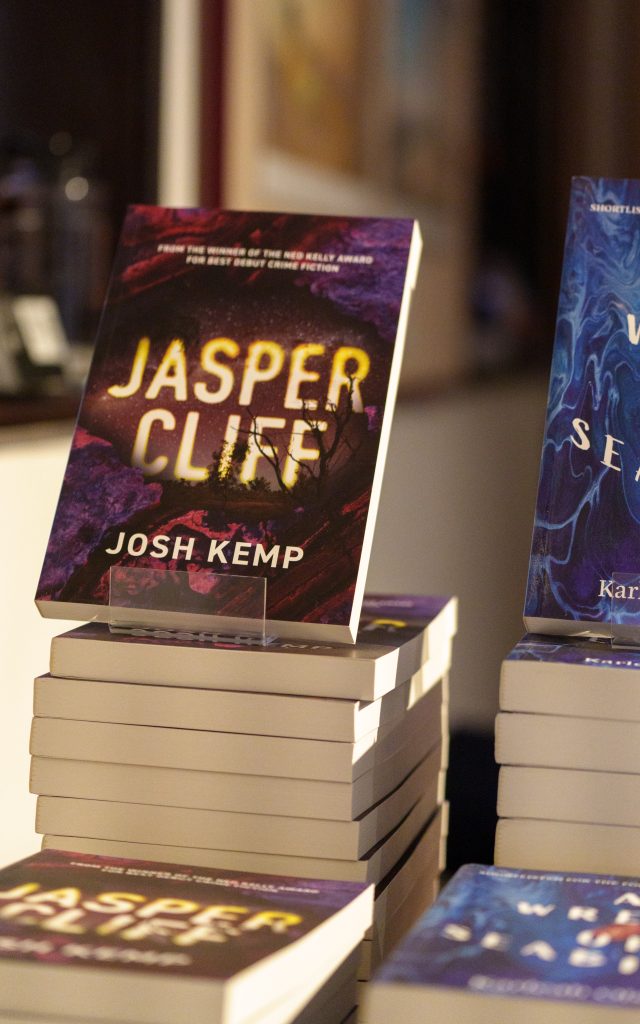
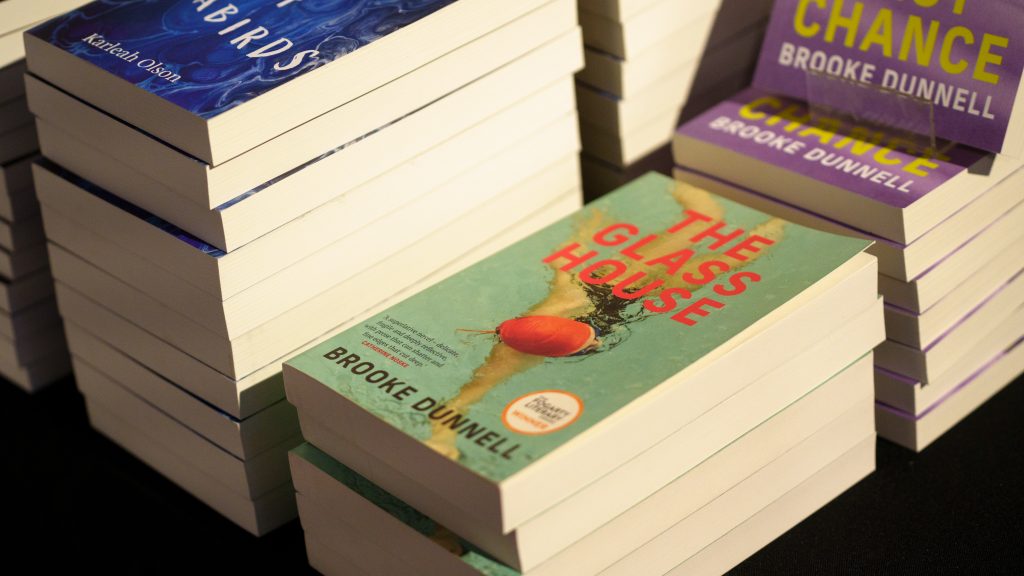
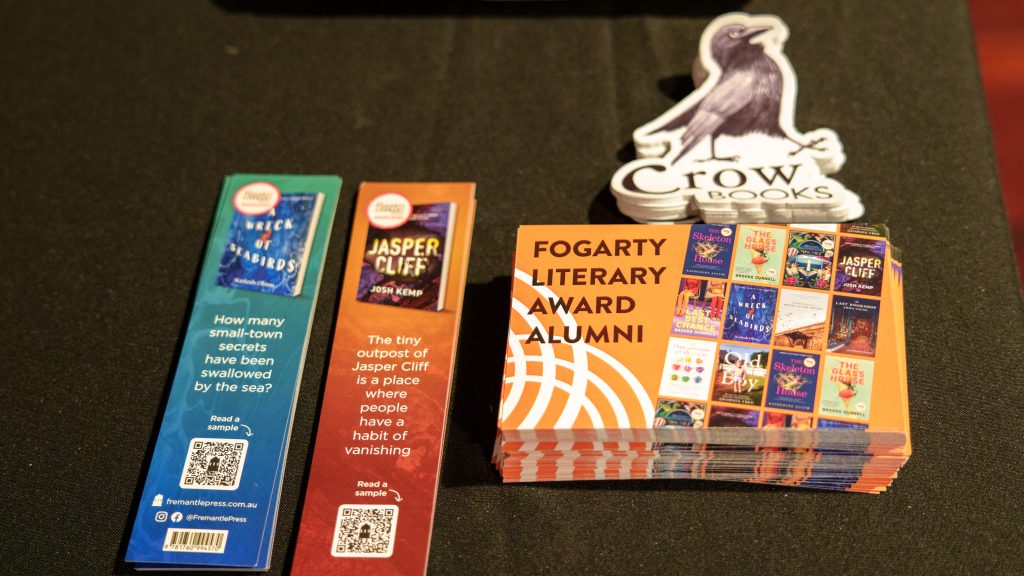
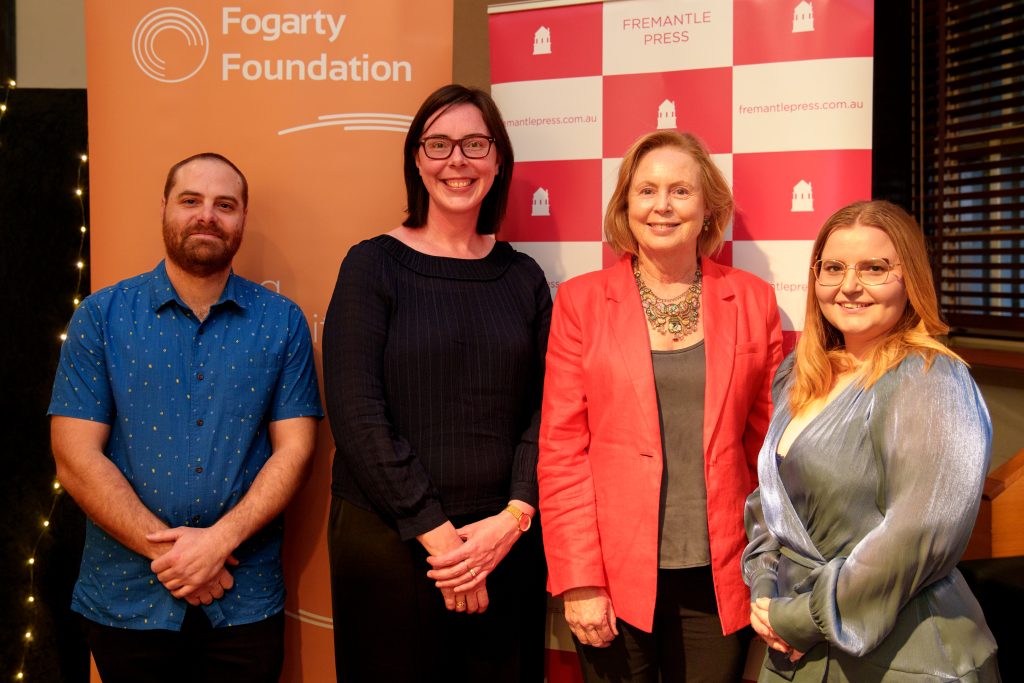
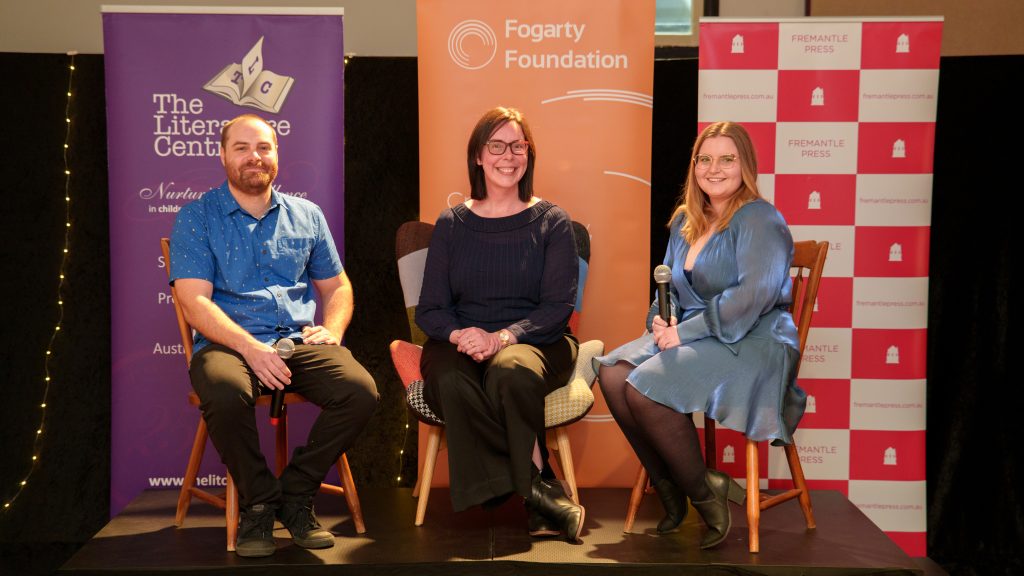
On Saturday, 17th August 2024, the Western Australian Institute for Educational Research (WAIER) hosted its 39th Annual Research Forum at the University of Notre Dame. Since its inception in 1986, this key event has served as a cornerstone for educational research in Western Australia, providing a platform for educators, researchers, and policymakers to engage in meaningful dialogue and share insights on the future of education. This year’s Forum, centered around the theme “Education Catalyst(s),” explored the driving forces behind change in education today.
The Forum brought together a community of participants from various educational sectors across the state, including schools and universities. WAIER’s commitment to fostering a collaborative environment was evident as both emerging and established researchers had the opportunity to present their findings, build collegial networks, and contribute to ongoing discussions on educational challenges and opportunities.
This year’s WAIER Research Forum commenced with a dynamic panel discussion, featuring a distinguished lineup of experts who delved into both global and local issues in education research and what it means to be an “Education Catalyst.” The panel included Dr. Cheryl Kickett-Tucker AM, an esteemed Noongar academic from Curtin University, known for her advocacy and dedication to Aboriginal self-determination; Dr. Julian Chen, an applied linguist and innovator in technology-enhanced language education also from Curtin University; Dr. Mathilda Joubert from Sheridan Institute of Higher Education, a leader in creativity and innovation in education; and Dr. Greg Thompson from Queensland University of Technology, whose research focuses on education policy, assessment, and the impact of teacher workload. Their collective insights provided a thought-provoking exploration of the catalysts driving change in education.
The event concluded with the presentation of a range of awards, marking a fitting end to a day of discussions and research. As a supporter of WAIER, the Fogarty Foundation is proud to sponsor the WAIER-Fogarty Foundation Postgraduate Student Research Prize. This prize aims to support educational researchers studying at an approved higher education institution conducting research relevant to early childhood, primary, secondary or tertiary education. Due to the outstanding quality of applications, this year’s Award was shared by two recipients; Tahnee West and Sophia Karangaroa. The recipients were recognised for their outstanding work to date, and in support of their research in the field of education. Tahnee will be expanding her work into the effects of mentoring on girls’ attitudes towards STEM and Sophia will be looking into Indigenous self-determination for Noongar and Māori university students.
’I am so grateful to Fogarty Foundation and WAIER for the funding they have provided me through the Postgraduate Student Research Prize. Because of this funding, I will now be able to travel to the National Mentoring Summit in Washington DC in January 2025, where I have been invited to present my PhD research into the effects of mentoring on girls’ attitudes towards STEM. I have a passion for spreading the word about the issues females face in engaging with STEM careers and study, so this is a particularly exciting opportunity for me.’
Tahnee West, 2024 Fogarty Foundation Postgraduate Research Prize
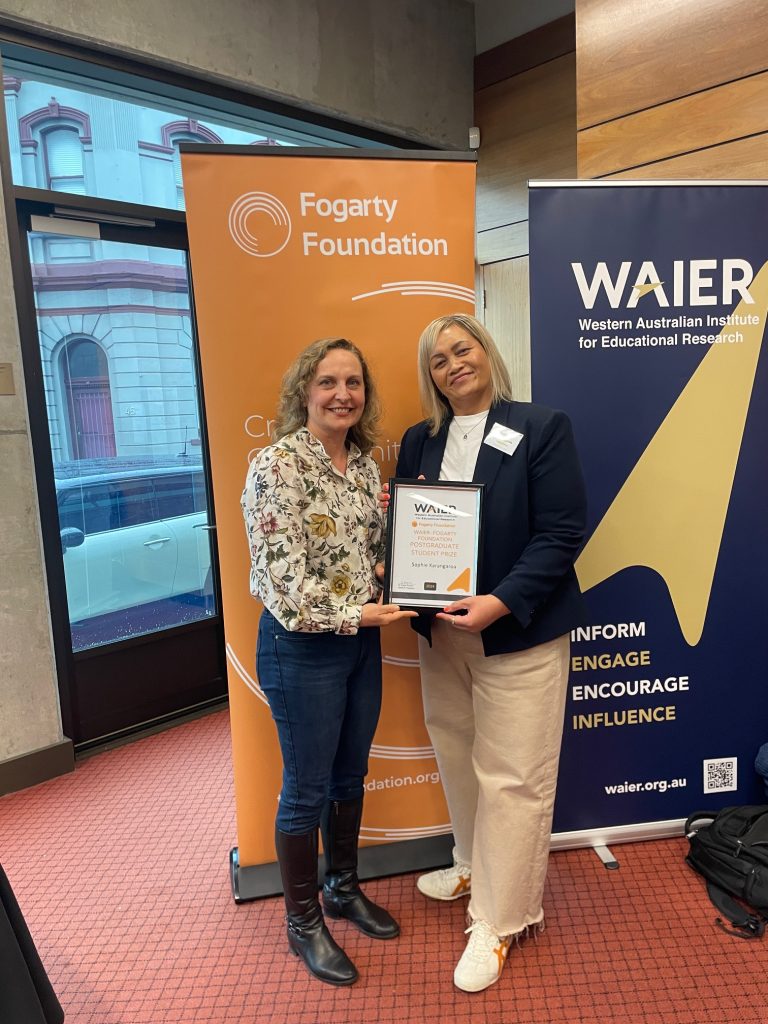
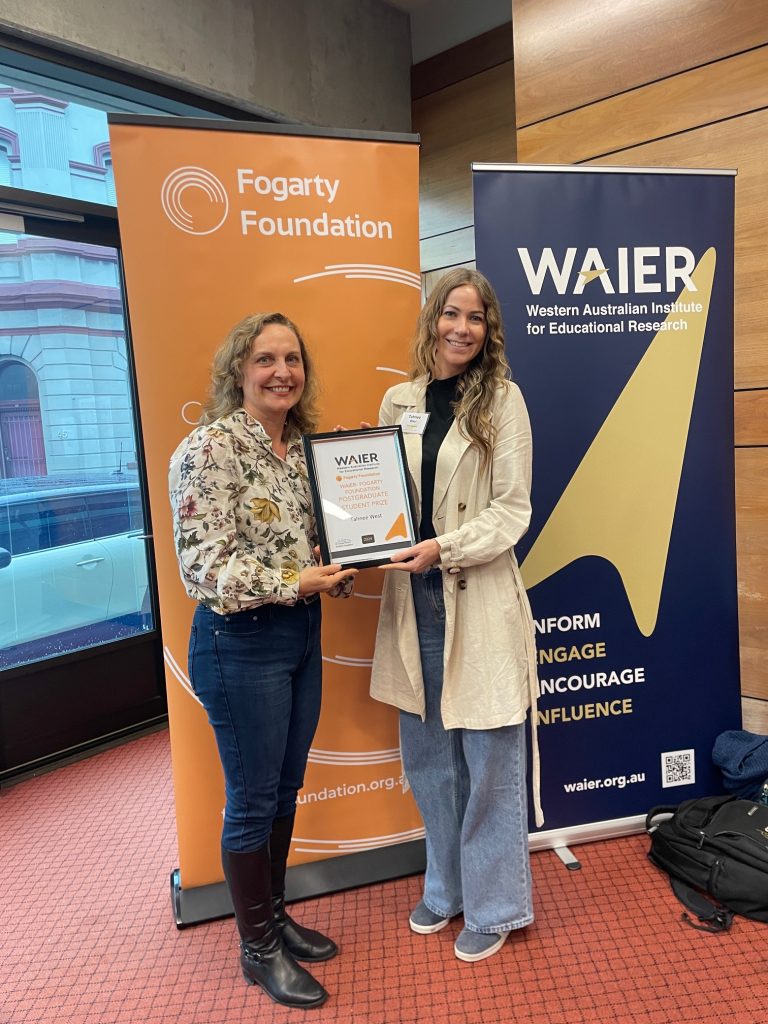
National Science Week 2024 is not only a celebration of scientific innovation but also a unique opportunity for schools to delve into the theme of “Species Survival – More than just sustainability.” In collaboration with the Australian Science Teachers Association (ASTA), this year’s school-focused initiatives aim to empower students to explore the multifaceted aspects of science and innovation that contribute to the survival and thriving of diverse species in our ever-changing world.
School Theme: “Species Survival – More than just sustainability”
The 2024 school theme for National Science Week provides a compelling lens through which students can investigate the critical role of science in ensuring the survival and prosperity of different species. This theme expands beyond traditional sustainability concepts, encouraging students to think critically about the impact of human activities on the intricate web of life.
Students participating will have the chance to explore a rich variety of topics, letting them dive into issues of interest. The array of subjects includes, but is not limited to:
- Disease-Causing Organisms: Understanding the dynamics of diseases and their impact on species survival.
- Life-Saving Chemicals: Exploring the role of chemicals in medicine and agriculture to support species’ well-being.
- Clean Water: Investigating the importance of clean water sources for the survival of various species.
- Photosynthesis: Delving into the fundamental process that sustains plant life and contributes to the overall ecosystem.
- Genetic Screening: Examining the role of genetics in species survival through advancements in genetic screening technologies.
- Physics of Building Structures: Understanding the impact of architectural design on the habitats of different species.
- Artificial Intelligence: Exploring the role of AI in conservation efforts and species protection.
- Microplastics: Investigating the effects of microplastics on ecosystems and species survival.
Dr. Brendan Barrett, Executive Director of the Australian Science Teachers Association, emphasises the importance of empowering students to think critically about the broader implications of human activities on species survival. Beyond the conventional focus on solar panels and recycling, the school theme aims to broaden students’ perspectives and connect them with the groundbreaking work being undertaken by scientists globally.
“Our goal is to empower students to think critically about the impact of human activities on species survival, enabling them to understand the breadth of the climate change issue beyond the need for solar panels and recycling. Scientists all over the globe are undertaking amazing work in this area. It is important that students and the community at large can see this work and understand how it is relevant to them.”
Dr. Barrett
Get your school involved here or you can download the free Species Survival teacher resource book (17.5 MB, pdf) and the companion student journal (4.8MB, pdf). There is also a flipbook version of the resource book. There are also great ideas for parents to get involved with a National Science Week event!
National Science Week offers a unique and enriching opportunity for students to engage with the complexities of science and innovation. By exploring a diverse range of topics, students will not only deepen their understanding of the natural world but also develop critical thinking skills essential for addressing the challenges of species survival in the face of a changing environment. With the guidance of ASTA and the collaboration of educators and students alike, National Science Week 2024 aims to inspire a new generation of scientifically informed and environmentally conscious individuals.
Explore a variety of statewide opportunities, both online and in person, to nurture your budding scientist! Consider visiting Scitech for hands-on experiences, or delve into NASA’s educational resources and opportunities to inspire a passion for the stars.
Rebecca Higgie’s journey to literary recognition reflects the power of storytelling and the support of the literary community. From her academic roots to becoming the inaugural winner of the first Fogarty Literary Award with her book The History of Mischief, Higgie’s path has been shaped by a blend of scholarly inquiry, creative exploration, and a deep-seated passion for narrative.
Before delving into the world of fiction, Higgie’s academic pursuits at Curtin University and Brunel University London centered on satire and politics. These studies influenced her perspective as a novelist, enriching her storytelling with nuanced insights into societal dynamics and human behaviour. “As an academic, you always need to critique your research materials, and that is an attitude I have taken to my writing,” Higgie reflects modestly.
Higgie’s journey as a writer began early. “I wrote my first little book when I was five years old. It was a story about fairies that I stapled into a booklet and gave to my mother. She never told me that I’d misspelt the word ‘fairy’ on every page, only saying how much she loved it. From then on, I was a writer, penning my first full novel when I was nine (it was rubbish, but what good practice it was!).”
Despite early confidence in her youth, Higgie’s writing journey faced challenges. “As a young teen, I wrote six novels and a few novellas, but after struggling with Year 11 and 12, I almost gave up writing.” However, her passion for storytelling persisted. “At university, when I tried creative writing units, I never did as well as my cultural studies courses. It dented my confidence, but I couldn’t stop telling stories to myself. So, I wrote The History of Mischief, the Fogarty winning book, largely in secret.”
The novel took twelve years to finish, a period during which Higgie balanced her studies, career, and starting a family. A pivotal moment came when she found unwavering support from her husband, Yirga. “My husband Yirga was the first person to read part of The History of Mischief, and his encouragement is what spurred me to finish after so many years of doubt.”
Higgie’s novel The History of Mischief is a rich tapestry of magic, mischief, madness, and mystery. Inspired by her personal experiences and love for history, she explores themes of grief and loss through a magical narrative. “It all started when I turned eighteen and my parents changed their will so I would become the legal guardian of my younger siblings if they both died. I was fortunate that this never happened, but it made me wonder what it would be like to navigate my own grief while suddenly becoming a parental figure to my siblings. From this, the characters of Jessie and Kay were born.”
Higgie’s academic background has significantly shaped her approach to writing. “I feel the need to research everything, which enriches my writing but is also very time-consuming. Sometimes, I read multiple books, journal articles or reports to write just one sentence (that may end up being cut anyway). For me, though, this is necessary. It helps me ‘live’ or ‘feel’ my story through having a deeper understanding about what happened during a particular time period, how people felt at the time, or how certain things work.”
Reflecting on her journey, Higgie acknowledges the significant impact of winning the Fogarty Literary Award on her career. “Since I was largely writing in secret, winning the Fogarty instantly skyrocketed me into the WA literary community. Overnight, I was welcomed in, embraced like an old friend. I have made so many connections that still buoy me today.”
Higgie’s advice to aspiring writers is to embrace their unique voice and persist despite doubts. “Feel the doubt and write anyway. Don’t write the book you think publishers want; write the book that burns inside you.”
She also emphasises the importance of initiatives like the Fogarty Literary Award in fostering a supportive environment for emerging writers. “The value of this award is that it not only gives you recognition, but it also says, ‘yes, the stories of young people are important!'”
For those curious about her literary tastes, Higgie recommends, “Three books that have resonated deeply with me are Humanity’s Moment by Joelle Gergis, Smart Ovens for Lonely People by Elizabeth Tan, and The Shadow of the Wind by Carlos Ruiz Zafon. Each offers a unique perspective and a masterful blend of storytelling that continues to inspire my own writing.”
Looking ahead, Higgie is working on her second novel, a work of adult historical and speculative fiction, and continues to engage with the literary community through workshops and festivals. Rebecca’s journey from passion to pages will hopefully inspire emerging writers and enrich the Australian literary landscape.
You can see more about her debut book here or learn more about the Fogarty Literary Award!